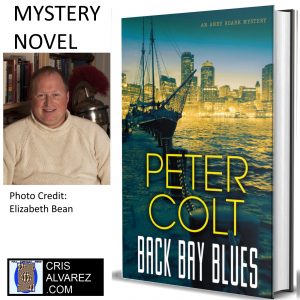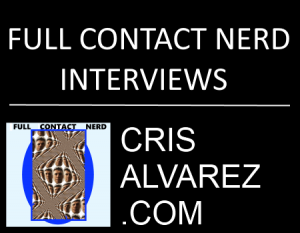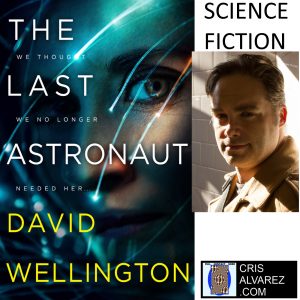 Mystery novel – An interview with Peter Colt about his new book Back Bay Blues published by Kensington. Check out the book here https://amzn.to/3cbmDfs
Mystery novel – An interview with Peter Colt about his new book Back Bay Blues published by Kensington. Check out the book here https://amzn.to/3cbmDfs
Of all the creative ideas you have, how did this one idea rise about the rest and get written?
I had this very specific vision of Andy hiding in water near an old ship. I couldn’t get that idea out of my head. Then everything was an outgrowth of one idea in my mind. Why was he hiding? Who was he hiding from? The answers started to come together when I saw two documentaries on PBS. One was about a group of former South Vietnamese Army officers in America who were still trying to overthrow the current Vietnamese government. The other was about the last days Saigon and the fall of Saigon. Suddenly scenes started popping into my head and the novel took hold and I wanted to write it to see how it ended.
What is the book about – protagonist, setting, and conflict?
Back Bay Blues is about Vietnam Veteran and now Private Investigator Andy Roark. Roark has felt lost since the end of the war because the Army gave him the only sense of family he has really had and the only sense of purpose he has known. It is March of 1985 and he is hired to investigate the murders of two Vietnamese men in and around Boston, Mass. He has also been quasi adopted by a Vietnamese family and is forced to realize that others lost much more in the war than he did.
His investigation brings him into direct conflict with the sinister Colonel Tran who belongs to a group dedicated to overthrowing the Communist Vietnamese government. Roark feels they are extorting money from the Vietnamese community. The murder investigation and the conflict with Colonel Tran bring to light the events of April 29, 1975 on the eve of the fall of Saigon.
Does Boston have a large Vietnamese community? I assume many were displaced there by the Vietnam War. Did the Boston community tend to come from any specific part of Vietnam?
As of 2018, the greater Boston Metro area had 28,000 Vietnamese people making up about .06% of the population (Migration Police Institute report, September 13, 2018). Yes, most were displaced by the war, but now much of the growth is due those who were displaced starting families and raising children. I can’t say for certain what regions they were from, but the former South Vietnam would be my guess.
What sort of aesthetic does the book have?
The book falls into the formula of the first-person gumshoe narrative. It takes place in the dying industrial New England, sunny Virginia and the San Francisco bay area. There is a lot of description except that it is in the 1980’s and my protagonist pokes a lot of fun at himself. He isn’t a very good detective and he’s a screw up.
If the book had a soundtrack, what might it be like?
Back Bay Blues actually does have a soundtrack! I make playlists for the books and I listen to them while I write. They are eclectic. My first book, The Off-Islander, had a lot of Steely Dan. This time there is more Doobie Brothers, Rolling Stones, Spencer Davis Group, a lot of Blues and some Jazz. There is also some electronica and or other things. I listen to put me in the time or the mood. There is a fair amount of classic Willie Nelson and similar Country music.
Did you have to do any research for the book?
Yes,. I do a lot. I was twelve in 1985 and lived on Nantucket Island. Andy Roark’s world is much broader than mine was. I had to research Saigon, the Fall of Saigon and then I spent a lot of time on Google Earth/Maps researching the area around Suisun Bay. I have read a lot about Army Special Forces in Vietnam and especially MACV-SOG. I work really hard to make the books as authentic as I can. I know I won’t get everything right, but I try. One of my recurring nightmares involves getting hate mail from angry Vietnam Veterans for not getting the Army stuff right.
Have you noticed any difference in community attitudes to Vietnam vets and Iraqi war vets in your community and perhaps attitudes the vets hold about their service?
I think that attitudes toward service changed after Vietnam for the better. After 9/11, attitudes toward veterans in general were definitely more positive. The Vietnam vets I knew when I was a kid didn’t talk much about their experience and I never saw anyone thanking them for their service. Now, there seems to be much more attention paid to Vietnam vets and vets in general.
The town of Bangor, Maine, is awesome! The Airport in Bangor is one of the layovers for troops going to and from Iraq and Afghanistan. The good people of Bangor, no matter the weather, no matter what time, day or night, have people there to meet every planeload of troops. When you walk down the Jetway to the terminal there are people on both sides clapping and cheering, reaching out to shake hands with soldiers. It is a fantastic feeling. They offer cell phones for troops to call loved ones and hand out snacks. That is a very different from how the Vietnam era veterans were treated.
What are some of the genre works that inspire you – books, movies, tv, music, etc.
I am a huge fan of Detective fiction. Raymond Chandler of course is an influence; you can’t write this type of book and not be a fan. I also like Science Fiction both books and film. Blade Runner is the perfect meld of detective fiction and Sci-Fi, and yes I am one of the few Philistines who loves the original release with the voice over narration that everyone else hates. I make a lot of Magnum P.I. references, to poke fun at Andy and me. That is obviously an inspiration. Musically I am all over the road, but I have to have music when I write. In terms of other books and movies I love spy genre and John Le Care is unparalleled. As a kid I loved Comic books and still like a good graphic novel.
What other things inspire your creativity?
I have a lot of diverse friends, cops, veterans, engineers, aging punk rockers and talking to them inspires me. I bounce ideas off them and a lot of them offer up things that get worked into my books. I hope to write a novel that has Andy Roark investigating something in the world of the 1980’s Boston Punk scene.
Do police deal a lot with private investigators? In books and movies it seems like the PI always has a police connection to help with certain problems. Is that true in real life?
Yes and no. A lot of cops retire and become investigators so they have connections on the job and could use those. The reality of it is that a lot of the information that fictional Private Investigators ask for, like running license plates etc., is usually tightly controlled and officers can get in real trouble for providing it. Much of that information is now available online, either as a public record (such as adult court records) or through a pay service like White pages. But reality doesn’t make for a good plot device.
What would you say are the big tone and style differences about having a PI as a main character versus having a police detective as the main character of a novel?
The PI is a more singular character. They usually don’t have a boss and/or an organization to answer to. As a writer, that can give you a lot more freedom to develop a plot. If the main character is a police detective they are saddled with a boss, rules, etc. there are things that they can’t do practically and still keep their jobs. There are stylistic expectations of the PI; they are loners, they usually are single with no family or divorced, they tend to drink too much. Because they don’t have to worry about getting their kids to the orthodontist ,or going to PTA meetings, or worrying about the mortgage, or taking the cat to the vet, the writer can more freely focus on the case itself. The police detective has a boss and rules. His breaking the rules can be a major plot line, think The Shield. Also he has more resources and can tackle bigger cases, like a serial killer or organized crime.
What is your writing and editing process like? Anything different from other authors?
I usually know how the story ends and have a couple scenes in my head when I start. It is all about getting to the end. In my mind the story is like a pond with lily pads and my protagonist is a frog jumping from lily pad to lily pad until we reach the end of the story. I write, go back the next day and tweak what I wrote the night before, then the next day write new material. I will write, read, reread and rewrite numerous times before I let someone else look at it.
How has your approach to writing changed over time?
My first book, The Off-Islander took ten years to write, lots of interruptions as life happened. Back Bay Blues took me about nine or ten months to write. I had an idea of what my editor was looking for and the story was much clearer in my mind start to finish. That helped a lot. I have started to approach writing not as a fun hobby that might work out but rather something that I am doing and have to do well. Books aren’t cheap and if someone is spending money on something I wrote, I don’t want them to feel like they wasted their money or time.
Have you done any non-writing work that has influenced how you write or what you write about?
I was in the Army Reserve and deployed to Kosovo and Iraq and those experiences certainly bring a flavor to what I write. I am a police officer in a city of around 175,000 people and that has influenced my writing as well. It helps to describe dead bodies or crime scenes if you have been to a few. It may also have something to do with why I don’t writer Romance novels..
When you were younger was there a power, technology, or fictional setting you yearned for or to be a part of?
Space. I wanted to be Captain Kirk, Jean-Luc Picard or Han Solo. I grew up on an island, which was great…but it is also like living in a small town that you can’t drive out of easily. A close second were the Dirk Pitt novels by Clive Cussler. Pitt was always in some exciting location, diving on some cool wreck.
Did you have any difficulties finishing this book?
Oddly no, this book went smoothly. It must have been the positive power of having a deadline. The first book though…that took ten years, a lot of fits and starts.
What’s your current or next writing project?
I am working on a third Andy Roark book which will be set a few months after Back Bay Blues.
Where can people find you online?
On Facebook I am Peter Colt Author. I am on Twitter and Instagram but FB is the easiest way to find me. I also have a website www.peter-colt.com. One of the cool things is that I am so new at this that I have the luxury of interacting directly with people who contact me.
Biographical information
Name: Peter Colt, author of The Andy Roark Mystery Series
Book Title: BACK BAY BLUES (Book 2 in The Andy Roark Mysteries – available in hardcover Sept. 29, 2020) and THE OFF-ISLANDER (Book 1 in The Andy Roark Mysteries – now available in paperback)
Bio: Peter Colt is an Iraq War veteran, a New England law enforcement officer and an FBI certified Crisis Negotiator. He spent over twenty years in the Army reserve and was deployed to Kosovo in 2000, where he was attached to the Russian Army. He was deployed to Iraq in 2003 and again in 2008, and has had the fortune of knowing many Vietnam vets and U.S. Army Special forces soldiers. Born in Boston, he grew up on Nantucket and lived there in the 1970s and 80s, when the distinction between off-islanders and on-islanders was very real. Visit Peter Colt online at Peter-Colt.com.
Links of interest
Check out the book here https://amzn.to/3cbmDfs
https://www.kensingtonbooks.com/9781496723420/back-bay-blues/
https://www.peter-colt.com/
As an Amazon Associate I earn from qualifying purchases.
 How a fantasy author made the successful switch to science fiction with Adrian Tchaikovsky
How a fantasy author made the successful switch to science fiction with Adrian Tchaikovsky
 Mystery novel – An interview with Peter Colt about his new book Back Bay Blues published by Kensington.
Mystery novel – An interview with Peter Colt about his new book Back Bay Blues published by Kensington.  David Wellington interview about his science fiction novel “The Last Astronaut”
David Wellington interview about his science fiction novel “The Last Astronaut”